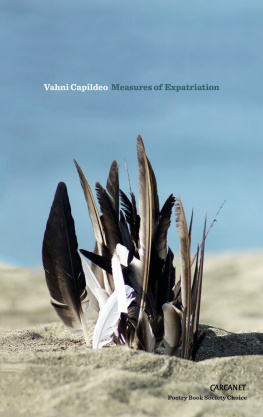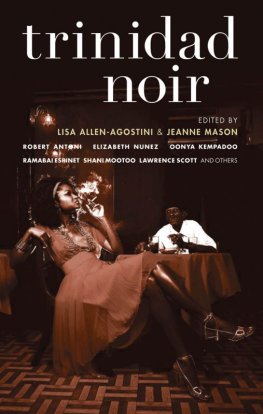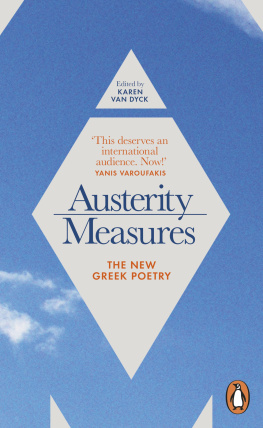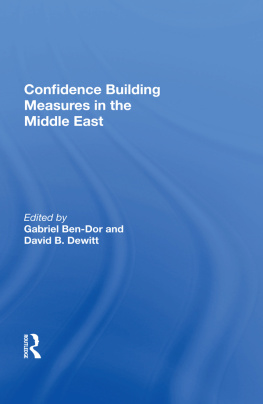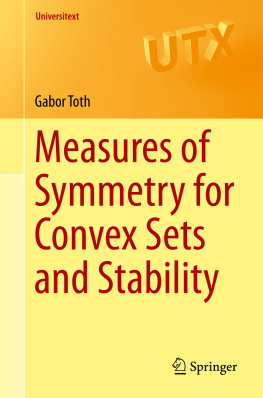Vahni Capildeo. - Measures of expatriation.
Here you can read online Vahni Capildeo. - Measures of expatriation. full text of the book (entire story) in english for free. Download pdf and epub, get meaning, cover and reviews about this ebook. City: Manchester, year: 2016, publisher: Carcanet, genre: Art. Description of the work, (preface) as well as reviews are available. Best literature library LitArk.com created for fans of good reading and offers a wide selection of genres:
Romance novel
Science fiction
Adventure
Detective
Science
History
Home and family
Prose
Art
Politics
Computer
Non-fiction
Religion
Business
Children
Humor
Choose a favorite category and find really read worthwhile books. Enjoy immersion in the world of imagination, feel the emotions of the characters or learn something new for yourself, make an fascinating discovery.
- Book:Measures of expatriation.
- Author:
- Publisher:Carcanet
- Genre:
- Year:2016
- City:Manchester
- Rating:3 / 5
- Favourites:Add to favourites
- Your mark:
- 60
- 1
- 2
- 3
- 4
- 5
Measures of expatriation.: summary, description and annotation
We offer to read an annotation, description, summary or preface (depends on what the author of the book "Measures of expatriation." wrote himself). If you haven't found the necessary information about the book — write in the comments, we will try to find it.
Measures of expatriation. — read online for free the complete book (whole text) full work
Below is the text of the book, divided by pages. System saving the place of the last page read, allows you to conveniently read the book "Measures of expatriation." online for free, without having to search again every time where you left off. Put a bookmark, and you can go to the page where you finished reading at any time.
Font size:
Interval:
Bookmark:
Vahni Capildeo was born and educated in Trinidad and holds a DPhil in Old Norse from Christ Church, Oxford. Landscape, language and memory inform her poetry and prose, notably those of Caribbean, Indian diaspora, Icelandic, Scottish and Northern cultures. She has worked in academia; for the Commonwealth Foundation; at the Oxford English Dictionary; and as a volunteer with Oxfam and Rape Crisis. As Judith E. Wilson Poetry Fellow 2014 at the University of Cambridge, she developed approaches to poetry through collaborative and immersive events. The Harper-Wood Studentship (2015) at St Johns College, Cambridge, will see her exploring similar collaborations abroad.
Vahni Capildeo

for Jeremy Noel-Tod
Eadig bi se e eamod leofa
She is away.
The feathers in my eye spoke outwards.
She is the accident that happens.
The sun bursts hazel on my shoulders.
She is the point of any sky.
Come here, here, here:
if its a tree youd sulk in, I am pine;
if earth, Im risen terracotta;
if its all to air youd turn, turn to me.
You are flying inside me.
Seventy times her weight,
I stand fast.
My hand is blunt and steady.
She is fierce and sure:
lands, scores, punctures the gloveskin.
And why I asked
for spirals stitched where she might perch:
fjord blue, holm green, scarlet, sand,
like her bloodline, Iceland to Arabia:
because her hooded worlds my hand
The tears curled from the cattles eyes, their horns curled back, their coats curled like frost-ferns on windshields or the hair on the heads of Sikandars soldiers. Two of my grandfathers sons, when he knew he was dying, took him from his bed. They supported him out the doorway so he could say goodbye to his favourite cattle. The cattle wept. They knew him. They are not like cattle here. They live among the household and on the hills, which are very green, and they eat good food, the same food as the household, cut-up pieces of leftover chapatti.
You do not get stories like that in books. I am telling you because you only have things to read. Whenever anybody tried to make me read a book or anything, I would fall asleep; my head would just drop.
What is the use of reading books? What can you do after that but get an office job? Do my friends who stayed at school earn as much as me? They all have office jobs; could they do a job like mine? Could they slaughter for seventy hours without getting tired or needing to sleep?
It was hard at first. I used to dream the cattle. They would come to me with big eyes, like mothers and sisters. After a few weeks, they stopped coming to me in dreams. After about five years, I stopped feeling tired: I do not need to sleep. We do three or four thousand a day in Birmingham, only a thousand a night in Lancaster.
Tonight I am going to Lancaster. I will talk to you until Lancaster. Where are you from? You are lying on me. No, where are your parents from? Are you lying on me? I came here as a teenager, and at once they tried making me read. How old are you? Why do you only have things to read? I am sorry I am talking to you. You have brought things you want to read. Beautiful reader, what is your name?
You can feel the quality of the meat in the animal when it is alive: the way its skin fits on its flesh. You can feel the quality of life in the meat. The cattle here are not good. They inject them. Their flesh is ahhh.
Look, look how beautiful. I will show you pictures of the place. Look, it is very green.
O Love, that fire and darkness should be mixd,
Or to thy triumphs such strange torments fixd!
John Donne, Elegy XIII
A northern street: the temperature of the ungovernable. The proud hooded stride. The skill to add up stone: cold outlasting. The wealth of the land: stone. Kindness: the harsh kind. For each question, a better question. For each better question, one answer. For each good question thatll do. Not fussed.
I walk the hollow walk: loving more than loved; moved, scarce more than moving.
and also
In the south of this country, five times I have attended the celebrations that they hold in the dark of the year. Many centuries ago, there was a man whose name was Guy, or Guido. He practised a different, competing version of the national religion. He tried to explode an important government site. These buildings are still in use. You can visit the place, which is on the river. Some of the children who ask for money on British streets are simply trying to fund their construction of effigies of this hate figure, whose burning on public and domestic pyres on the so-called Bonfire Night (5 November) has become a popular ritual. Fireworks are let off; it is legal to purchase them for your own festivities.
no join
A northern street, uphill. It branches, like a Y, a peace sign, water coursing round an outcrop; like part of the net of a tree; like It branches in two. Upon the slope held between the branches stands a sooty church, now in use as a nightclub. This pale and brisk morning glances on the metal railings.
Who is he?
Nobody.
Who is he, between the fence and lamp post?
Nobody. A hat stuck on the railing, abandoned by a tidy drunk. A feeble visual joke. Nobodys head, nobodys, supports a hat drooped at that angle.
It is a guy. A Guy Fawkes guy. The students left him there: lad for the burning: unreal, it has to be unreal. Check out this guy.
I have to cross the road, so I do.
The ordinary-looking foot is wedged between the base of the fence and the lamp post. The left arm, bent at the elbow, has been tucked deep into the jacket pocket, toneless. It is not a bad face. The eye is the pity of it: tender lids tightened into a crescent, as happens with mortally wounded birds; infolding, no longer able to yield, a turning inwards of the ability to light up.
I put my hand into my pocket, for my phone.
It is not necessary.
Pale and brisk as this morning, the police car slides into my peripheral vision.
and also
A street in Trinidad: the soft, brown ground doves have the same manners as the pedestrians. Unhurried, they traipse along in front of cars. Why did the ground dove cross the road? I dont know, but its certainly taking its time.
The exception came plummeting out of the recessive sky, into the back yards concrete rain gutter. Had a neighbourhood boy felled it inexpertly? Had the ecstatic efficiency of its heart thumped to a stop? It lay there, the softness, and would not, could not bestir itself.
The child strewed it with yellow and scarlet wild lantana flowers, thinking of burial, accustomed to cremation; feeling a sudden fear. The parents took it all away.
And when the dove was gone, another came plummeting the same way; the riddle repeated to be moved, moving, and never to move. Love or some other force was identical in the equation.
no join
We brought few friends home who were not already part of at least a two-generation family circle. We brought few friends home. This time my brother had introduced a soft and brown and tallish young man in his early twenties, who weighed not much more than a hundred pounds. By historical pattern, not personal choice, in our secular Hindu household, this was the first Muslim friend our age.
Next pageFont size:
Interval:
Bookmark:
Similar books «Measures of expatriation.»
Look at similar books to Measures of expatriation.. We have selected literature similar in name and meaning in the hope of providing readers with more options to find new, interesting, not yet read works.
Discussion, reviews of the book Measures of expatriation. and just readers' own opinions. Leave your comments, write what you think about the work, its meaning or the main characters. Specify what exactly you liked and what you didn't like, and why you think so.

